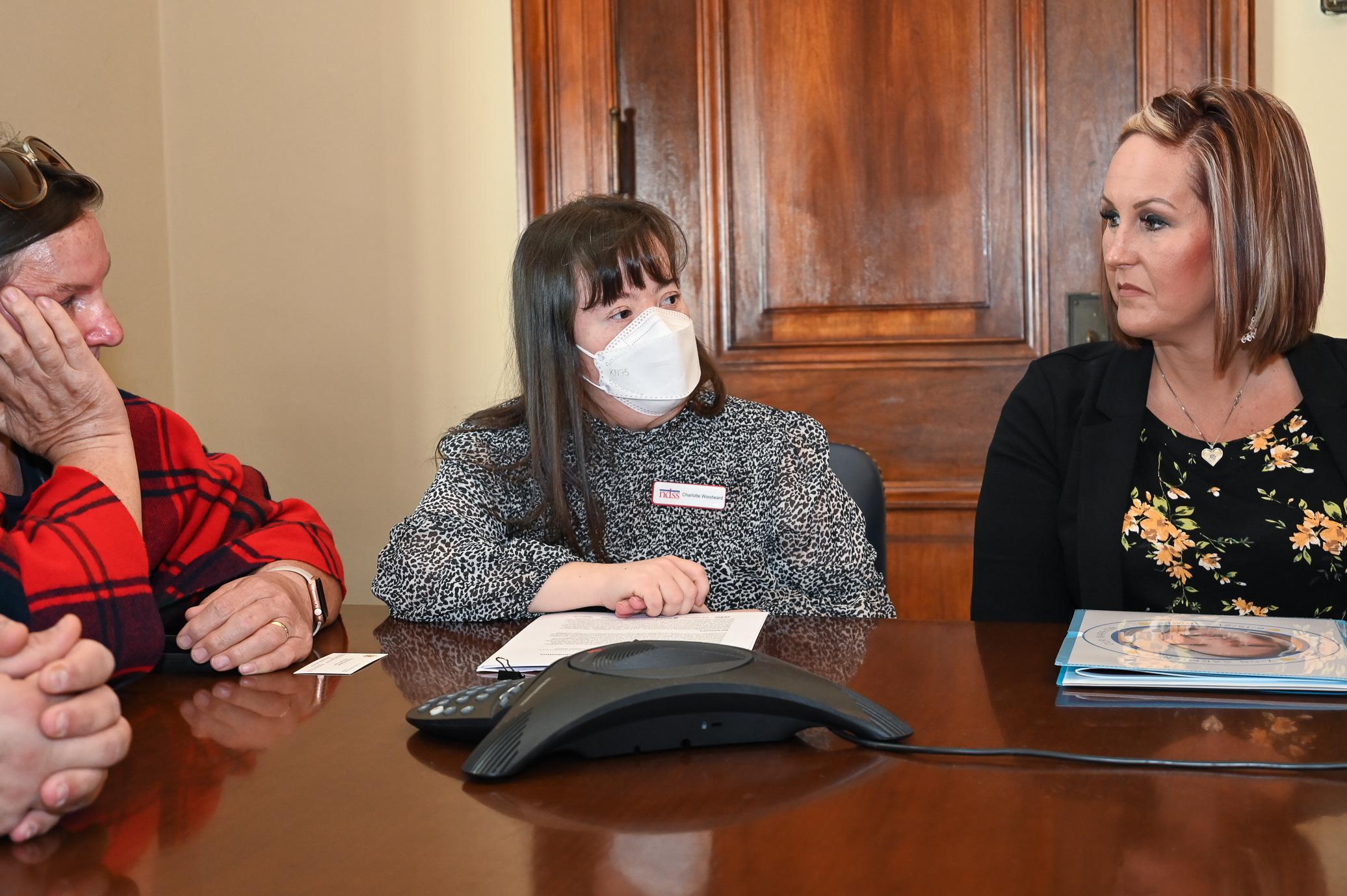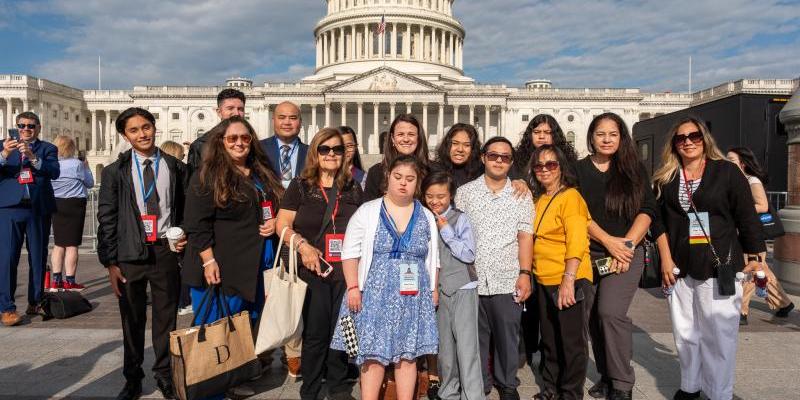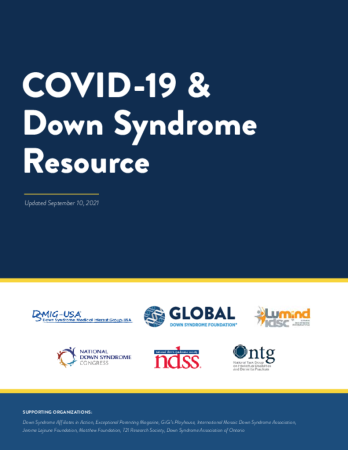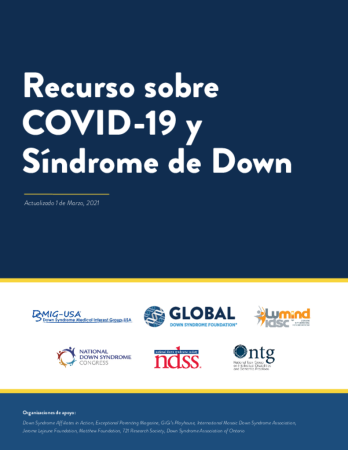
COVID-19 (coronavirus disease 2019) is a disease caused by the SARS-CoV-2 Virus and can often feel like a cold, the flu, or pneumonia.1
The Centers for Disease Control and Prevention (CDC) includes individuals with Down syndrome on the list of high-risk conditions that increase a person’s risk of becoming severely ill and needing to go to the hospital if they are sick with COVID-19. Individuals with Down syndrome may have other underlying medical conditions that further increase their risk for severe illness from COVID-19.2
For additional information on COVID-19 and Down syndrome, vaccines, and ways to stay safe, you can view the below resource made in collaboration with the Down Syndrome Medical Interest Group-USA (DSMIG-USA), the GLOBAL Down Syndrome Foundation, the National Down Syndrome Congress, and the National Task Group on Intellectual Disabilities and Dementia Practices.
COVID-19 Vaccination
A study by the Trisomy 21 Research Society (T21RS) has shown COVID-19 vaccines to be safe for individuals with Down syndrome. In this study, there were also minimal breakthrough infections, which are infections that may occur after the individual is fully vaccinated.
The American Academy of Pediatrics, the American Academy of Family Physicians, other professional organizations, and the CDC currently recommend the COVID-19 vaccine for anyone over the age of six months after consulting with a healthcare professional. Since some individuals with Down syndrome may be at an increased risk of severe illness from COVID-19, and research suggests the vaccines are safe and effective, it is recommended that individuals with Down syndrome follow these guidelines as well.3-5 All healthcare decisions should be made after consulting with a trusted healthcare professional.
COVID-19 Treatment Options
If you or your loved one has COVID-19 or COVID-19-like symptoms, the CDC recommends waiting to go back to normal activities until:
- your symptoms are better overall
- you do not have a fever for at least 24 hours (without the use of fever reducing medications)6
For an additional five days, you should consider taking precautions such as practicing good hygiene, wearing a mask, and physical distancing. These precautions help prevent others from getting sick as well.
There are medications available for people who have COVID-19 and are more likely to get very sick. These treatments must be started 5-7 days after symptoms first develop in order to be effective. If you are concerned about your loved one developing severe illness from COVID-19, talk to a trusted healthcare professional about treatment options right away.7
The Massachusetts General Hospital Down Syndrome Program also has additional information on considerations and common questions for individuals with Down syndrome and COVID-19. Additional resources on COVID-19 and Down syndrome can be found below.
The information on this page is for informational purposes only. NDSS is not a healthcare provider, and this information should not be construed as medical advice or a substitute for professional guidance. Please consult with your or your family member’s qualified healthcare team or other trusted professionals to determine your/their personal health care and support needs (if any).
External Resources
- Best practices to protect yourself from COVID-19, testing, and treatment
- How to tell the difference between COVID-19, the flu, and RSV
- Information for individuals with disabilities on the COVID-19 vaccine
- Myths about COVID-19
- Efficacy of the third COVID vaccine dose on individuals with Down syndrome
- Long COVID in adults with intellectual disabilities
- COVID-19 vaccine for individuals with intellectual and developmental disabilities
References
- Centers for Disease Control and Prevention. About COVID-19. Published June 13, 2024. https://www.cdc.gov/covid/about/index.html
- Centers for Disease Control and Prevention. People with certain medical conditions and COVID-19 risk factors. Published June 11, 2025. https://www.cdc.gov/covid/risk-factors/index.html
- Trisomy 21 Research Society. COVID-19 and Down syndrome survey. https://www.t21rs.org/results-from-covid-19-and-down-syndrome-survey/
- Valentini D. Safety and long-term immunogenicity of BNT162b2 vaccine in individuals with Down syndrome. Journal of Clinical Medicine. 2022;11(3):694. https://doi.org/10.3390/jcm11030694
- Huls A. Medical vulnerability of individuals with Down syndrome to severe COVID-19 date from the Trisomy 21 Research Society and the UK ISARIC4C survey. eClinicalMedicine. 2021;33,100769. https://doi.org/10.1016/j.eclinm.2021.100769
- Centers for Disease Control and Prevention. Preventing spread of respiratory viruses when you’re sick. Published August 18, 2025. https://www.cdc.gov/respiratory-viruses/prevention/precautions-when-sick.html
- Centers for Disease Control and Prevention. Types of COVID-19 treatment. Published May 8, 2025. https://www.cdc.gov/covid/treatment/index.html









